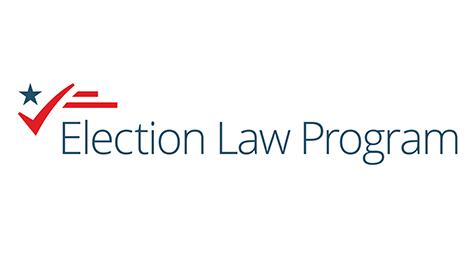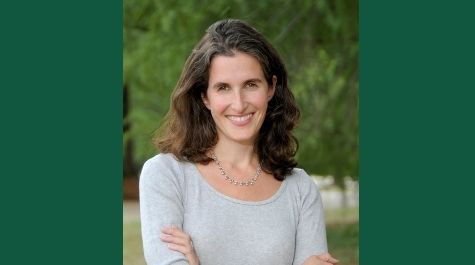The Election Law Program: Q&A with Professor Rebecca Green
Q&A with Professor Rebecca Green
 Professor Rebecca Green has served as co-director of the Election Law Program since 2008. Her research explores topics such as election administration transparency, redistricting transparency, and candidate privacy. She has been a featured expert in media coverage of the 2020 election, including in The New Yorker, Wisconsin Public Radio, The Guardian, The Financial Times, and Bloomberg Law.
Professor Rebecca Green has served as co-director of the Election Law Program since 2008. Her research explores topics such as election administration transparency, redistricting transparency, and candidate privacy. She has been a featured expert in media coverage of the 2020 election, including in The New Yorker, Wisconsin Public Radio, The Guardian, The Financial Times, and Bloomberg Law.
When was the program created and what was its original charge?
After Bush v. Gore, election litigation rates skyrocketed and the Conference of Chief Justices (made up of the chief justice of each state’s supreme court) reached out to the National Center for State Courts (NCSC) asking for election law resources. Professor Dave Douglas and the President of the NCSC Mary McQueen started the Election Law Program in 2005 responding to this need.
Can you tell us about the Program’s endeavors today?
Each year, the Election Law Program hosts a symposium focusing on a topic of interest to the student planners. We’ve done symposia on topics like judicial campaign finance, McCutcheon v. FEC, 2020 redistricting, and election security to name just a few. In addition to these symposia, our student-run Election Law Society (ELS) hosts a speaker series which brings in attorneys practicing in the field to share their work. Speakers have ranged from Federal Election Commission and U.S. Election Assistance Commission commissioners to presidential campaign counsel to voting rights attorneys and everything in between. Our goal at William & Mary Law is to connect our students with people practicing election law on the ground.
As for projects the Election Law Program and the Election Law Society undertake, they range from Revive My Vote, a project to help Virginians with felony conviction histories regain the right to vote, to the Alliance of Students at the Polls, an initiative to organize law students nationwide to recruit student poll workers and observers.
William & Mary students have also taken on stand-alone projects, providing research for groups like the League of Women Voters, the ABA Standing Committee on Election Law, the Presidential Commission on Election Administration, and Protect Democracy. Our students write amicus briefs, provide research support for redistricting reform, and get involved in the practice of election law from all different angles.
In each of these efforts, the goal of our Program is to expose students to different facets of this field, help them make connections with practitioners, and find ways that they can have a positive impact on American democracy.
Where can you find William & Mary law graduates working in the field of election law?
We have an alumni page that profiles some of our graduates who have been active in ELP and ELS and details their professional accomplishments. We strongly believe that election law need not be something lawyers do as side jobs, but can be a fulfilling, full-time career. ELS alums work at organizations like the Brennan Center and the Campaign Legal Center, at federal agencies like the Election Assistance Commission and the Federal Election Commission, in private practice political law groups at firms like Jones Day, Wiley Rein, Perkins Coie, Venable, Sandler Reiff, and others. We also have alums who have gone on to work as counsel at state election offices. We are committed to plugging William & Mary Law students into the huge range of opportunities in the election field in our ever-expanding network.
Can you tell us about election law courses offered at the Law School?
In addition to a basic Election Law course, William & Mary Law offers a menu of election law “mini courses” with practitioners in the field. These courses include campaign finance, advocacy regulation (lobbying law), election security law (the first law school class of its kind in the country), campaign lawyering, advanced voting rights, and international election law. We are working to add a course in Spring 2021 on nonprofit election law. For the past four years, I have also co-taught a class with an instructor from the Center for Geospatial Analysis at William & Mary. We teach students to use GIS software to redistrict Virginia. Students come out of the class with a set of skills few in the country have—particularly relevant for the upcoming redistricting cycle. So far, three students who have taken the class landed full-time jobs in the redistricting field. The menu of our mini course offerings changes as different issues arise and we see opportunities to expose our students to important topics in the field.
Are there ways for students to take their interest in election law even further while in school?
The Election Law Program makes it a point to find ways for students to do externships during the school year and summer internships to get experience in the field. Examples of internships include working at redistricting reform organizations, state elections departments, law firm political practice groups, at federal election agencies, or with nonprofit voting rights groups. We have an expansive network of alums and friends in the field who we regularly connect our students with. Because there are so many ways to practice election law, it’s a great idea to sample different aspects of the field while you’re a student.
What do you want students to get out of the program?
My first priorities are to make connections between our students and practitioners in the field and to expose students to the varieties of the practice of election law. A good number of our alums do land positions in the field and have been doing amazing work. Whether it’s leading state redistricting reform efforts, practicing campaign finance law, or ensuring secure elections, I’m really proud of our alums’ efforts to improve our democratic system. Even for those students who plan to practice in other areas, William & Mary offers students the opportunity to learn the nuts and bolts of democratic citizenship so that that they can better their communities wherever their careers take them.
The Election Law Society is hosting its first-ever presidential election debriefing for the William & Mary community at 1PM on November 4. What will the event feature?
Election Law Society planners for this event have purposefully left it open-ended. We’ll have to see what the world looks like on November 4th. More than likely, we will not know who won the presidential election—most experts agree that no winner will be declared on election night. What is most certainly the case: there will be much to discuss about this election; it has been unlike any other. ELS may use this event as a forum for people to ask questions and share thoughts. Or, if appropriate, we may feature a last-minute speaker to talk with the William & Mary community depending on what issues arise. We have a deep bench of friends in the election law world. I have no doubt we will draw upon those connections to unpack 2020 for months to come.
About William & Mary Law School
Thomas Jefferson founded William & Mary Law School in 1779 to train leaders for the new nation. Now in its third century, America's oldest law school continues its historic mission of educating citizen lawyers who are prepared both to lead and to serve.
